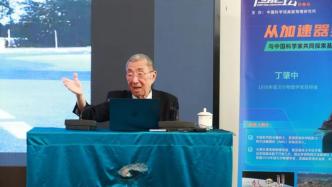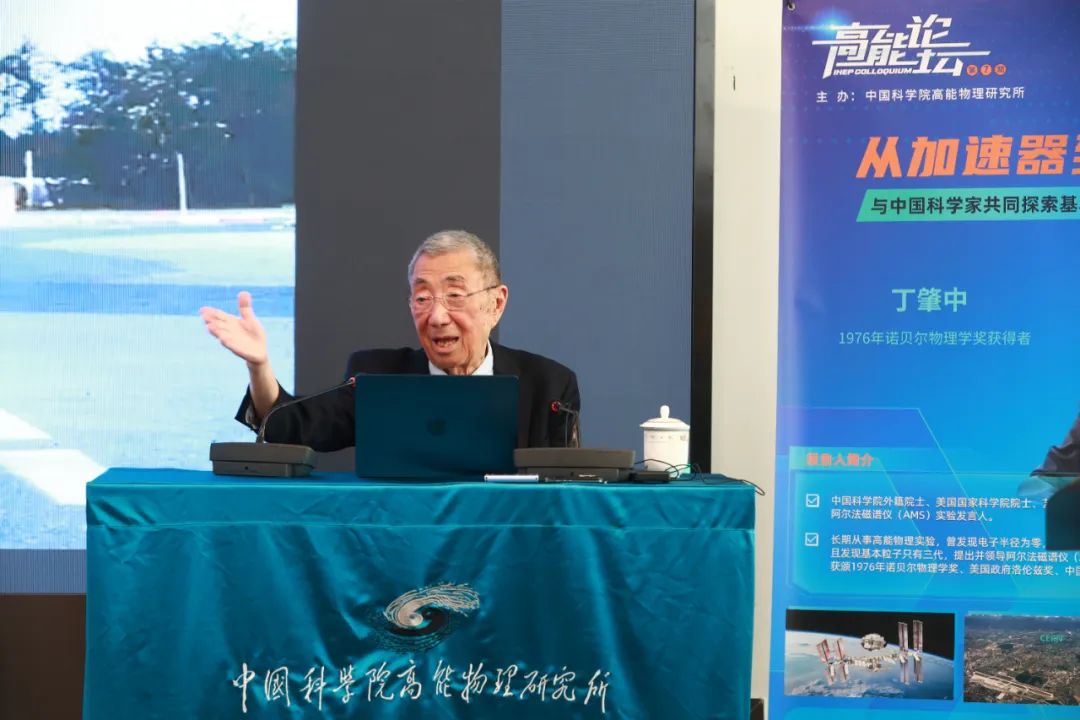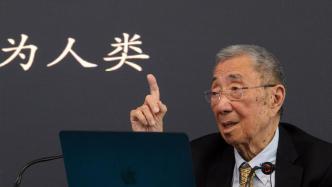
"Every one of my experiments has been opposed by many people, especially the experiments on the space station." On May 16, Ding Zhaozhong, the 87-year-old Nobel Prize winner in physics, gave a speech at the "High Energy Forum" of the Institute of High Energy Physics, Chinese Academy of Sciences. said when reporting.
This day happens to be the 12th anniversary of the launch of the Alpha Magnetic Spectrometer (AMS) experiment he led.

Ding Zhaozhong is giving a report. Photo courtesy of Institute of High Energy Physics, Chinese Academy of Sciences
AMS is a particle physics experiment aboard the International Space Station. Recalling the process of establishing the AMS project, Ding Zhaozhong said bluntly that the AMS experiment was initially opposed by many people on the grounds that "the experiment has no physical meaning" and "the experiment is extremely difficult and impossible to succeed."
When faced with doubts, Ding Zhaozhong asked the US government to organize a review committee and invite the world's top scientists to review his project. "First-rate scientists can look forward and make judgments about the future, while the first question for ordinary scientists is 'what should I do now that I have given you the money'." Ding Zhaozhong told the Chinese Journal of Science.
After face-to-face communication with the review committee composed of first-class scientists and aerospace engineers, Ding Zhaozhong gained support, "People who have competed with me before fully agree that this experiment should be done."
On May 16, 2011, NASA's space shuttle Endeavor launched AMS-02 from the Kennedy Space Center in Florida.
At present, AMS has achieved a number of significant results. For example, it is found that the positron energy spectrum in the universe is truncated in the high-energy region, and the high-energy positron spectrum is exceeded, which can be explained by dark matter particles, and may also come from supernovae; it is found that the positron energy spectrum is very similar to the proton energy spectrum; The stiffness spectra of many nuclides are very similar. These findings are difficult to explain with existing theories.
"The universe is the most extensive laboratory, and our understanding of the universe is limited. All the observation results of AMS are inconsistent with the existing cosmic ray theory. It brings a new understanding of the universe, and it will continue to expand and subvert Our understanding of the universe." Ding Zhaozhong said.
As a physicist who values experiments, Ding Zhaozhong rarely expresses his opinions on things he doesn't understand. He said that this has something to do with the admonition given to him by his friend and physicist Feynman. In 1976, two days after Ding Zhaozhong won the Nobel Prize in Physics, Feynman said in a congratulatory message to Ding Zhaozhong: "Don't think that you have become an expert just because you won the award."
But for the large-scale electron-positron collider that is currently widely debated, Ding Zhaozhong said: "I still have some understanding of the collider."
He used "very important" and "very favorable" to evaluate the "large-scale electron-positron collider with a circumference of 100 kilometers" currently being discussed in China and Europe. "From the discovery of the Nobel Prize in high energy physics, we can clearly see that the higher the energy of the center of mass of the accelerator, the more unimaginable things can be discovered." Ding Zhaozhong said.
In 2012, after the discovery of the Higgs particle, Chinese high-energy physicists first proposed a large-scale electron-positron collider (CEPC) plan, but two years later, shortly after the release of the "Preliminary Conceptual Design Report", CEPC triggered widespread controversy.
"Opposition is not a bad phenomenon, but it is meaningless to solve scientific problems by voting. The progress of science is that the majority obeys the minority. Only when a very small number of people overthrow the views of the majority can science move forward." Ding Zhaozhong explain. (Original title "Ding Zhaozhong's Comments on the Collider: "Very Important" and "Very Agree")
